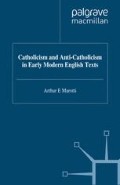Abstract
The existence in early modern England of large numbers of people who did not share the zealotry of Romish recusants and Protestant Puritans has recently become important for explaining what happened in the later English Reformation. In particular we have had our attention drawn to the ‘occasional conformists’ whose opinions were more or less Catholic. In the words of Christopher Haigh,
those (or the children of those) who had reluctantly surrendered Catholic ritual in the 1560s now expected from their ministers as much ceremony as the Church of England would sanction. Although theirs was a residual religion, and they were the spiritual leftovers of Elizabethan England, they should not be dismissed as ‘mere conformists’, for in their defence of ceremonies and festivities they formed a factor to be reckoned with.1
They consciously rejected the interfering ministrations of Puritan evangelicals, though, we are told, the new seminarist clergy never ministered to more than a minority of them.2
Access this chapter
Tax calculation will be finalised at checkout
Purchases are for personal use only
Preview
Unable to display preview. Download preview PDF.
Notes
C. Haigh, ‘The Church of England, the Catholics and the People’, in C. Haigh, ed., The Reign of Elizabeth I (London, 1984), 195–219
at 219, and passim. See also now A. Walsham, Church Papists (Woodbridge, Suffolk: Boydell Press, 1993 ).
C. Haigh, ‘The Continuity of Catholicism in the English Reformation’, Past and Present 93 (1981): 37–69
C. Haigh, ‘From Monopoly to Minority: Catholicism in Early Modern England’, Transactions of the Royal Historical Society, fifth series, 31 (1981): 129–47
C. Haigh, ‘Puritan Evangelism in the Reign of Elizabeth I’, English Historical Review 92 (1977): 30–58.
Richard Broughton, An Apologicall Epistle (Antwerp [imprint false, printed secretly in England], 1601), 87–8;
Christopher Muriell, An Answer unto the Catholiques Supplication (London, 1603), sigs D’—D2
cf. Gabriel Powell, The Catholikes Supplication unto the Kings Maiestie; for Toleration of the Catholike Religion in England (London, 1603), 11
Gabriel Powell, A Petition Apologeticall (Douai [imprint false, printed secretly in England], 1604), 11–12, 28
John Colleton, A Supplication to the Kings most excellent Maiestie (printed secretly in England, 1604), 4.
CSPD 1581–90 343. In early 1584 Lord Hunsdon’s notes of the papists operating in London included ‘one Phillippes, dwelling at Dr. Goods’ [sic] in Chancery Lane, a great dealer with priests, and a sender and director of them from place to place’ (H. Foley, Records of the English Province of the Society of Jesus , 7 vols. [London: Burns and Oates, 1875–83], 6: 721). A government informant mentioned vaguely that ‘divers of the seditious parties’ would be found at Good’s house in Chancery Lane over Easter 1594 (CSPD 1591–4 471).
PRO, PROB 6/3, f. 21; PRO, C 78/474/6; R.B. Manning, Religion and Society in Elizabethan Sussex (Leicester: Leicester University Press, 1969), 226–8; HMC Salisbury MSS 3: 115, 136–7. Lumley had also founded a lectureship at the Royal College of Physicians.
Lord Lumley (the Goods’ acquaintance and eventual neighbour at Malden) employed as a servant the brother of Cuthbert Trollop, one of the most vitriolic supporters of James against the pretensions of Spaniolized English Romanists (CSPD 1601–3 211; G. Anstruther, The Seminary Priests, 4 vols. [London: Ware and Great Wakering, 1968–77], 1: 363–4).
D. H. Willson, ed., The Parliamentary Diary of Robert Bowyer 1606–1607 (Minneapolis: University of Minnesota Press, 1971), 330–3; Commons Journals 1053a records only the first point, and thus garbles the sense of the speech. Good’s speech is an excellent example of how someone can shape a debate by highlighting the areas in which he agrees with the previous speakers (who were in this case attacking the violation of the Commons’ privilege of free speech) but then effecting a U-turn, in Good’s case, by interpreting James’s intervention as a benevolent request rather than a peremptory command.
M. C. Questier, ‘Loyalty, Religion and State Power in Early Modern England: English Romanism and the Jacobean Oath of Allegiance’, Historical Journal 40 (1997): 311–29.
P. Milward, Religious Controversies of the Jacobean Age ( Lincoln: University of Nebraska Press, 1978 ), 99–119.
26.CSPD 1603–10 486; K. N. Ross, A History of Malden (New Malden, 1947), 72–4
O. Manning and W. Bray, History and Antiquities of the County of Surrey, 3 vols. (London: J. Nichols & Son, 1804–14), 3: 8.
Dictionary of National Biography, sub Richard Hooker, Walter Travers; cf. R. Bauckham, ‘Hooker, Travers and the Church of Rome in the 1580s’, Journal of Ecclesiastical History 29 (1978), 37–50.
P. Lake, Anglicans and Puritans? (London: Unwin Hyman, 1988 ), 146, 156, 173.
Ibid., ff. 20’-3; cf. R. Dodaro, and M. C. Questier, ‘Strategies in Jacobean Polemic: the Use and Abuse of St Augustine in English Theological Controversy’, Journal of Ecclesiastical History 44 (1993): 432–49, at 439–41.
M. C. Questier, ‘Crypto-Catholicism, Anti-Calvinism and Conversion at the Jacobean Court: the Enigma of Benjamin Carier’, Journal of Ecclesiastical History 47 (1996): 45–64, at 54.
M. C. Questier, Conversion, Politics and Religion in England, 1580–1625 (Cambridge: Cambridge University Press, 1996), chs. 2–4.
C. Haigh, English Reformations: Religion, Politics, and Society under the Tudors ( Oxford: Clarendon Press, 1993 ), 267.
Editor information
Editors and Affiliations
Copyright information
© 1999 Palgrave Macmillan, a division of Macmillan Publishers Limited
About this chapter
Cite this chapter
Questier, M., Healy, S. (1999). ‘What’s in a Name?’: A Papist’s Perception of Puritanism and Conformity in the Early Seventeenth Century. In: Marotti, A.F. (eds) Catholicism and Anti-Catholicism in Early Modern English Texts. Early Modern Literature in History. Palgrave Macmillan, London. https://doi.org/10.1057/9780230374881_6
Download citation
DOI: https://doi.org/10.1057/9780230374881_6
Publisher Name: Palgrave Macmillan, London
Print ISBN: 978-1-349-40689-0
Online ISBN: 978-0-230-37488-1
eBook Packages: Palgrave Literature & Performing Arts CollectionLiterature, Cultural and Media Studies (R0)

